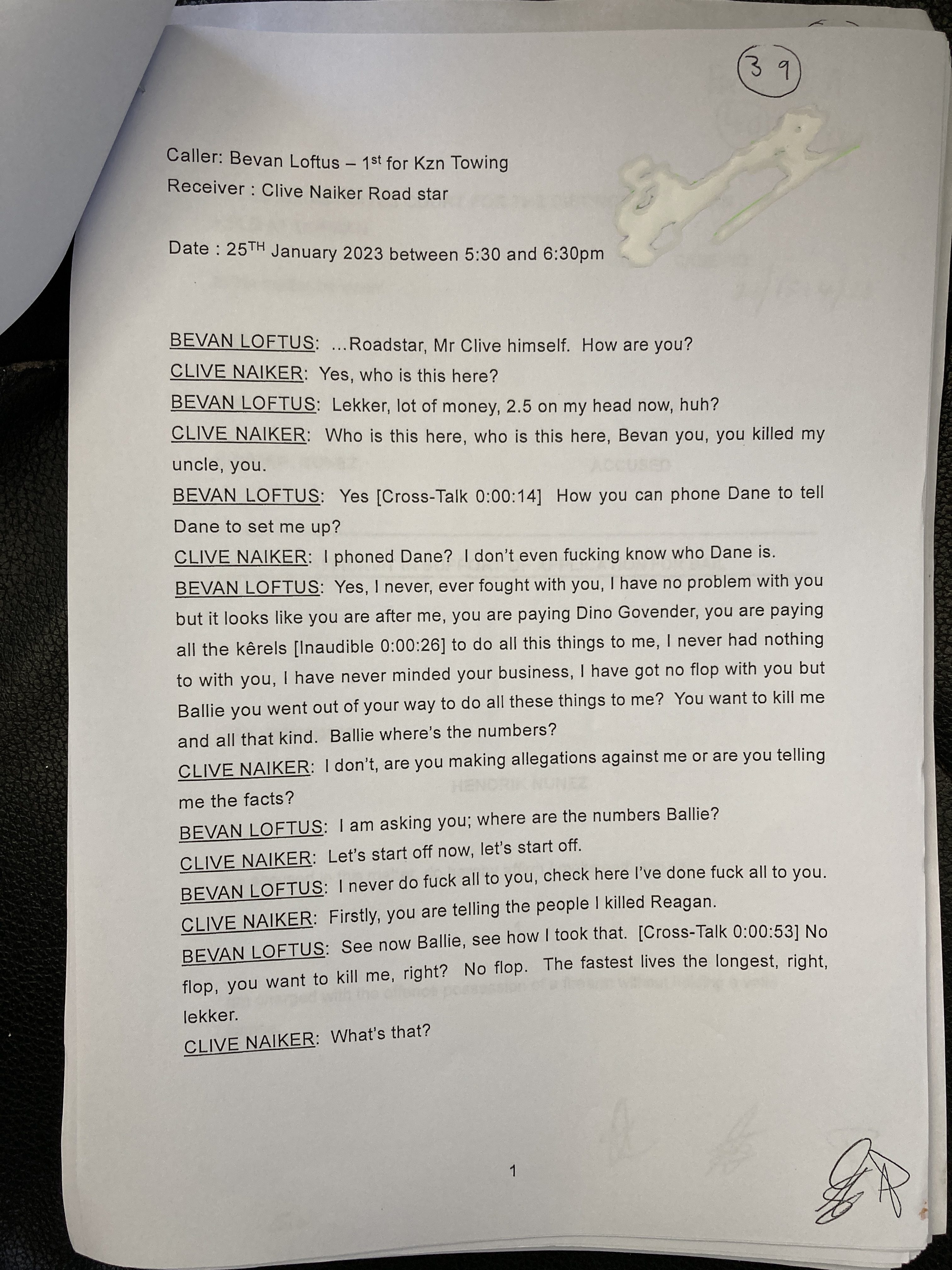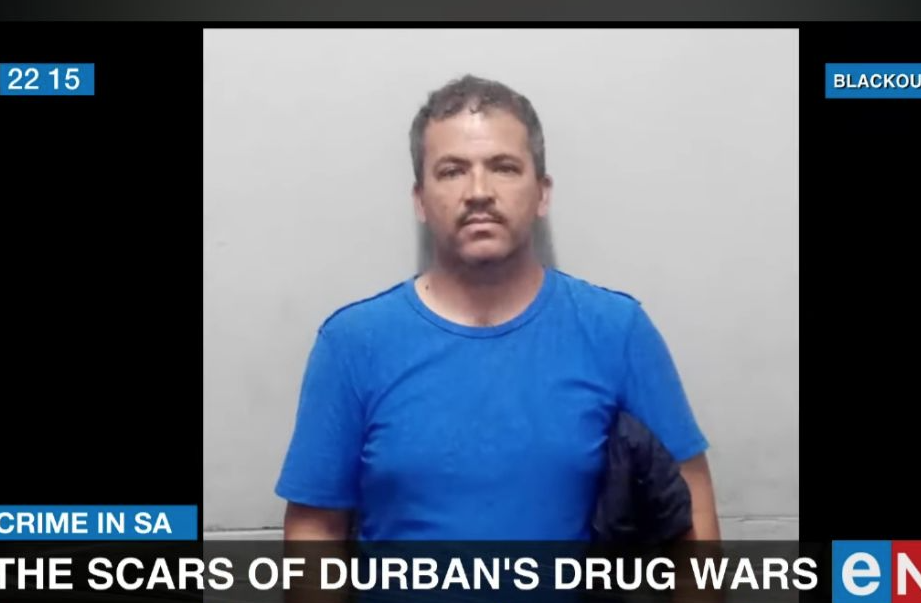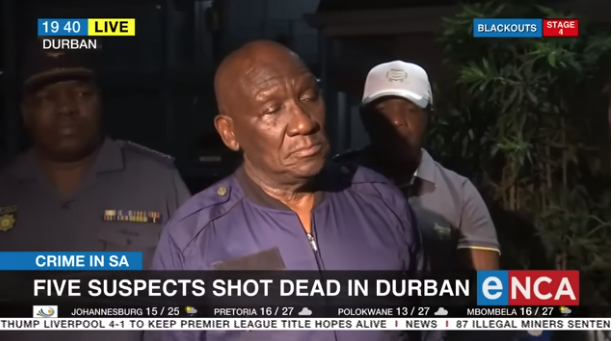Home › Forums › ⚖️ CRIME INVESTIGATION LIST ⚖️ › Gunfight, or police ‘hit’? Interdict against top cops exposes KZN’s dark underbelly and bloody drug wars
- This topic is empty.
Viewing 1 post (of 1 total)
-
AuthorPosts
-
2023-04-30 at 15:07 #402197
 Nat QuinnKeymaster
Nat QuinnKeymasterThe recent killing of five men by police in KwaZulu-Natal has shone a spotlight on the murky underworld of drugs and assassinations. The five men were killed in a swish apartment in the up-market Durban suburb of Morningside, in what the father of one of the men killed has called an ‘execution’. Police have denied this.
The shooting of the five men happened a day after a former policeman sought a high court interdict to stop police from killing his son – but it was too late.
The ex-cop’s allegations offer a window into Durban’s vicious drug wars, long beset by claims of police collusion with gangsters.
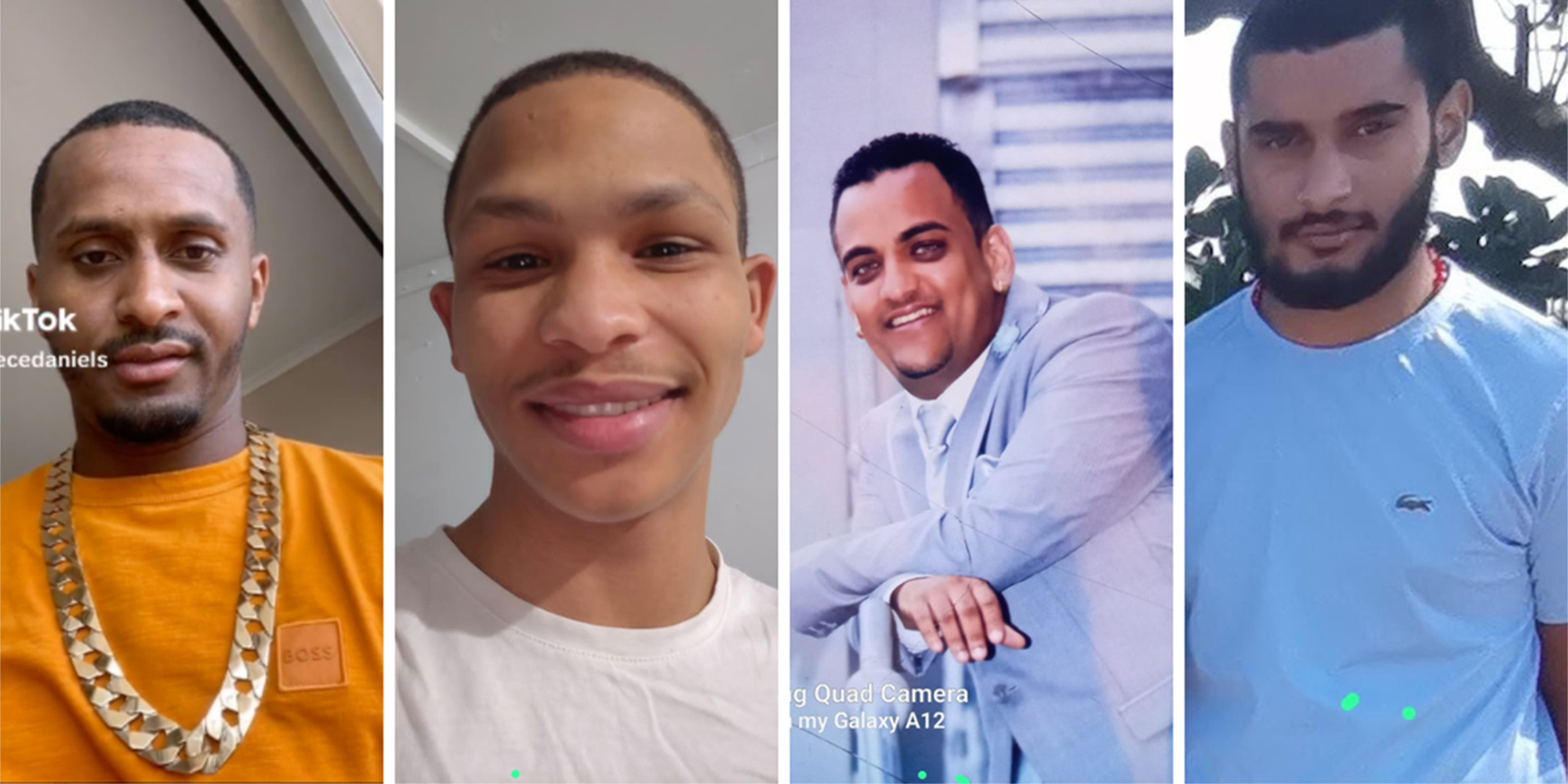
Ryan Santos, Chase Fynn, Bevan Loftus and Michigan Hippolyte were shot dead by police in Durban on 1 April. (Photos: Supplied)
A day before Bevan Loftus was shot dead in a gruesome shootout with police, his father Gregory launched high court proceedings in an attempt to secure an interdict to stop the cops from killing his son.
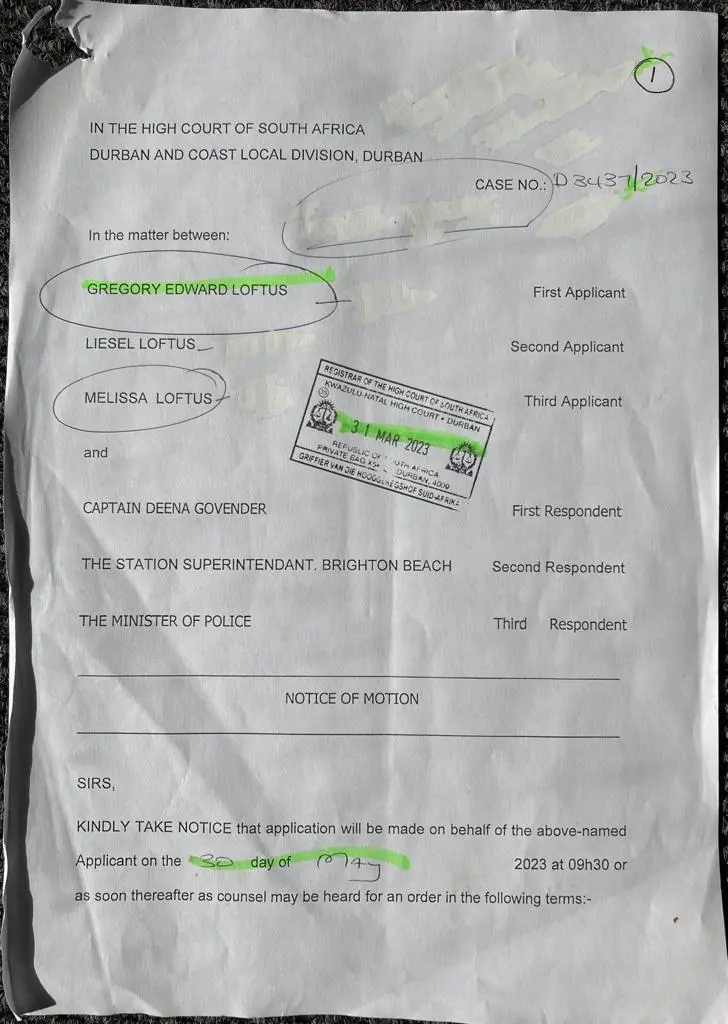
Court papers filed by Gregory Loftus.
Bevan Loftus (34) was a tough tow-truck operator with a mean reputation who died with four others in what police described as a violent clash on the afternoon of Saturday, 1 April.
The five were killed in a swish apartment in the up-market Durban suburb of Morningside, in what Gregory Loftus, Bevan’s father, has called an “execution”. Police have denied this.
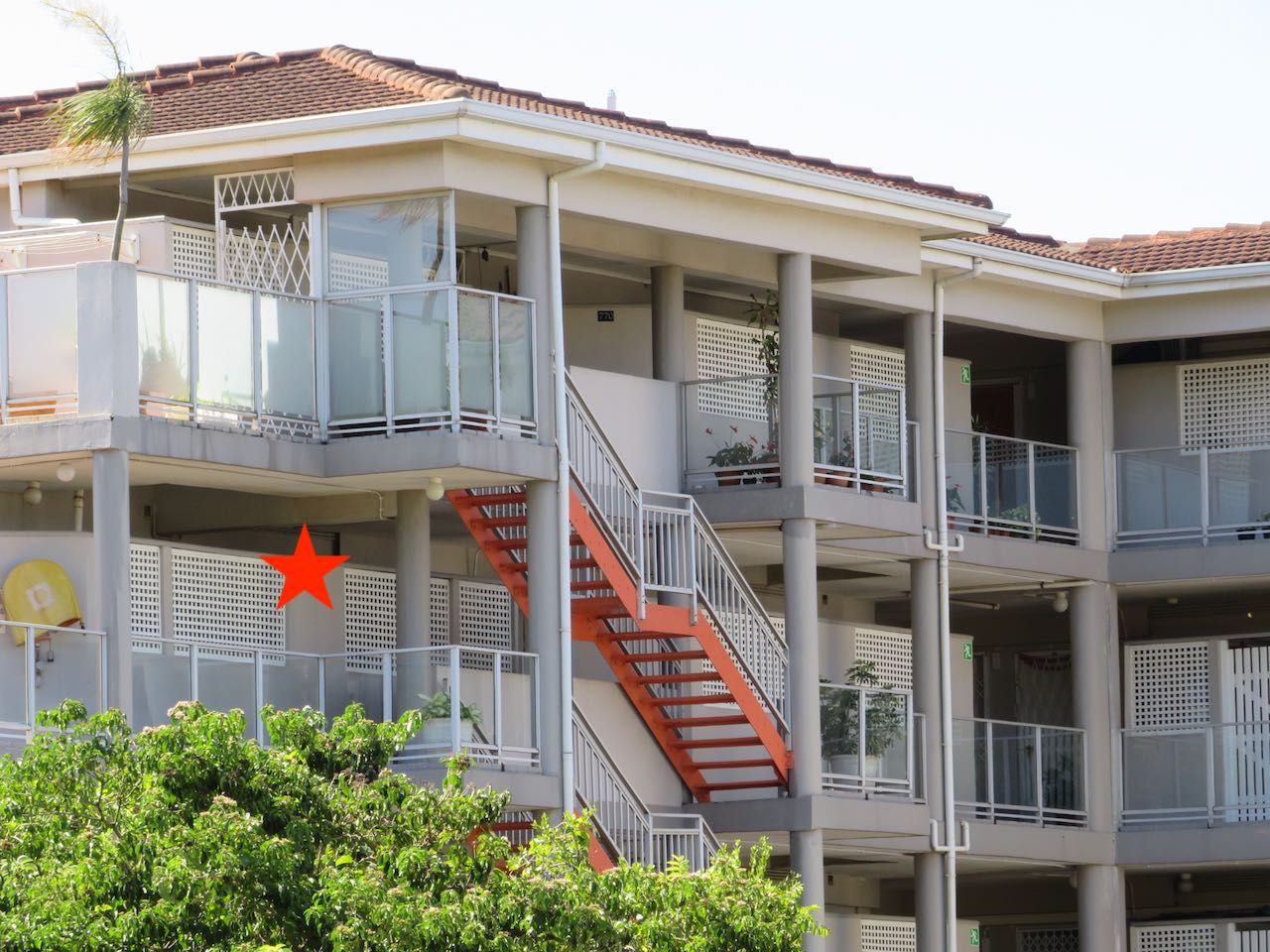
The apartment where Bevan Loftus and others were cornered by the police. (Photo: Supplied)
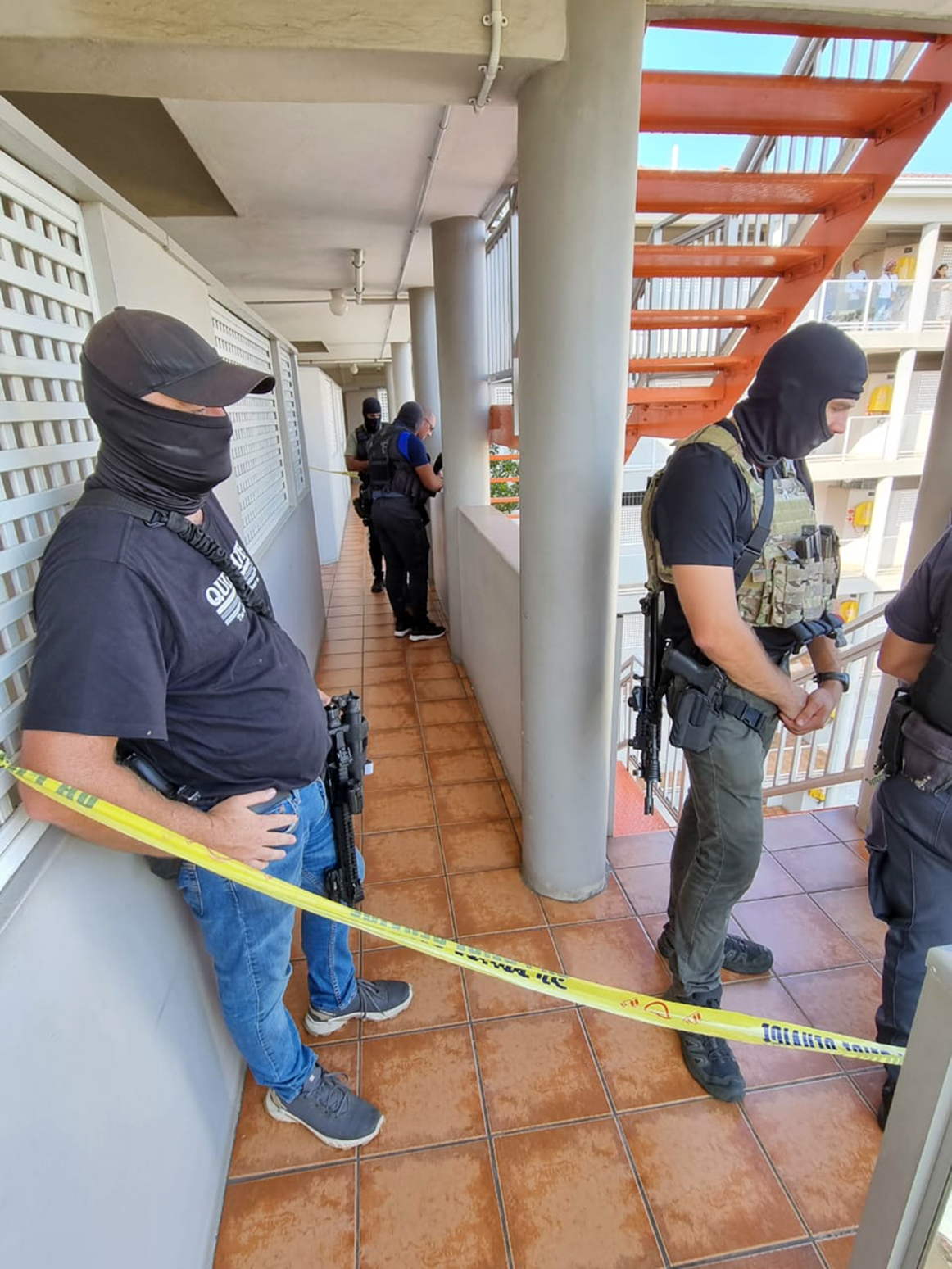
Police at the scene after the shooting. (Photo: Supplied)
Loftus lived on the Bluff, a rough neighourbood on the industrialised south side of Durban, a 30-minute drive from where he and his friends died.
When specialised police units blitzed the complex he was hiding out in, neighbours of the high-end apartments, with views of the Umgeni River and the Indian Ocean, scurried for cover.
Four of Bevan’s friends who were killed along with him have been named: Ryan Santos, Chase Fynn, Michigan Hippolyte and Sihle Zondi.
A police source said Zondi was wanted for a murder in downtown Durban. Another policeman described Zondi as an “inkabi” or hitman.
Hippolyte and Fynn were from Wentworth.
Ryan Santos was a convicted robber who was widely rumoured to run drugs in Newlands, about 30 minutes north of where the men were shot.
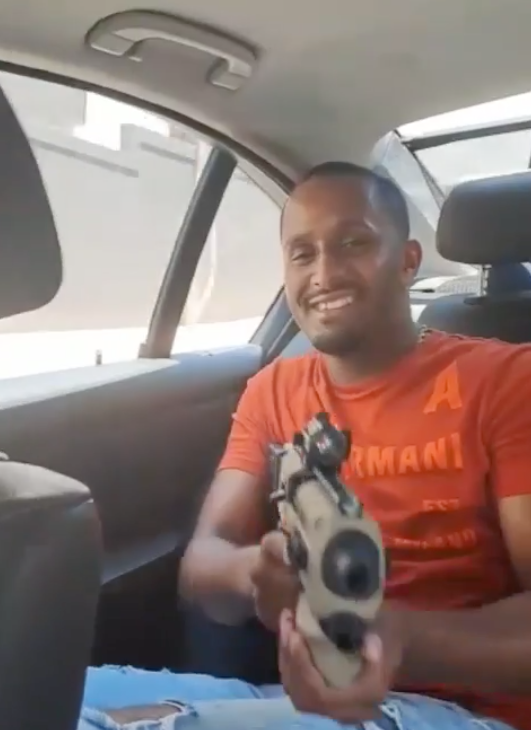
Ryan Santos with guns. (Photos: Supplied)
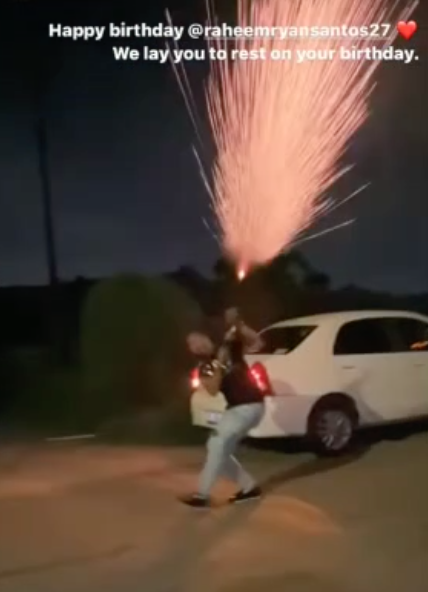
A setup?
According to court papers filed by Gregory Loftus, a former warrant officer with the drug squad, his son had been falsely accused of attempting to murder police officers near a Bluff butchery in a shooting on 3 February.
Loftus alleged in detailed court papers that claims of the shooting near the butchery were trumped up.
He said CCTV footage seized by police could prove that his son never left home on the day and that the shooting had, in fact, never happened.
In his affidavit, Gregory said he feared for his son’s life after between 20 and 30 policemen from the Hawks Anti-Gang Unit arrived at their family compound on the Bluff (three adjacent houses) on 13 December last year, looking for Bevan in connection with two attempted murder cases.
Bevan was not home but Gregory was arrested for attempting to impersonate a police officer and defeating the ends of justice.
Gregory was held in custody for 10 days and released on bail.
He said the police raided the family compound again on 3 February, and Bevan fled, fearing for his life.
Gregory said, on that day, Hawks Captain Deena Govender and other cops said they were “here not to arrest Bevan but to kill him”.
Gregory’s application was for an interdict against Police Minister Bheki Cele; Captain Govender; and the station commander of Brighton Beach police station near the Bluff.
The application was issued out of the Durban High Court on Friday March 31.It came too late to save Bevan.
In the application, Gregory says: “Bevan was threatened with assassination and has been informed there is a contract to kill him … I believe police interest in Bevan is as a result of improper and unlawful motives in that they have a relationship with the criminal elements who wish to kill Bevan who they consider a competitor in the tow trucking industry.”

Gangs, drugs and tow trucks
Gregory’s affidavit says gang violence in Wentworth increased in 2020, and since then, five of Bevan’s drivers had been shot by members of the Cartel gang.
This had resulted in four deaths in separate shootings: the victims were Colin Pillay, Nhlanganipho Dube, Brian Capteux and Antonio Goldstone.
Wentworth had become “a war zone”, Gregory Loftus said.
“Every day one hears or reads of gang-related shootings and killings. Because he is perceived to be in opposition to the other tow truck operations, a narrative has been created that Bevan is responsible for all the shootings.”
Gregory said he received information last year that a R2.5-million contract had been put on Bevan’s head.
“I know that the hit on my son Bevan was genuine. The word was that I should be careful because if they cannot kill Bevan, they would kill my son Nicholas [a former Bolt taxi driver] or myself.”
Gregory alleged that Captain Govender told him to get “Bevan’s burial policy up to date because I am going to bury him”.
Gregory said: “As a father, I cannot in good conscience hand my son over to the police for the very real fear and likelihood that he will be killed while in their custody.”
Gregory told Daily Maverick that Bevan had begged him to get the interdict soon, as he feared the police would find him and kill him.
The father said he didn’t know where his son was hiding but they spoke often on the phone, including 15 minutes before his son was killed.
“I blame myself that I didn’t do enough. I failed to save my son.”
Police, he said, claimed Bevan shot dead fellow tow truck operator Marlon Stuart last year and attempted to kill Stuart’s boss “Alan” in January.
(In January this year, Durban South Towing’s Alan Subramoney survived after gunmen opened fire on his car while parked outside a bakery on Durban’s Berea.)
Hiding from the police
Gregory was arrested during both police raids on the family compound, held in custody and charged. Police seized his old police-issue bulletproof vest and two-way radios.
When he was released on bail after the second arrest in February, Gregory set about securing the order attempting to prevent police from killing Bevan.
But, while the interdict was processed and stamped and due to be served on Monday, 3 April, police shot Bevan dead at 2pm on a sunny Saturday.
Gregory Loftus told Daily Maverick the family had hired a private pathologist.
They don’t believe Bevan and his friends fired at the police before their killing and he says independent ballistics would prove this.
“My son and his friends were executed. They were killed with head shots. The private pathologist says my son was shot dead while lying down.”
The butchery shooting
Much of Gregory’s court application is dedicated to the so-called butchery shooting on the Bluff which apparently prompted the police search for his son.
Gregory’s interdict has a confirmatory affidavit by his attorney, Burt Laing, who said his instruction was that there was a R2.5-million reward for the killing of Bevan, who was afraid to hand himself over to the police because they were “intent on killing him”.
He said Gregory Loftus showed him CCTV footage from the butchery Bevan was supposed to have visited, and “there is no indication of a shooting incident”.
Gregory alleged police created the incident as a reason to arrest Bevan.
He told Daily Maverick: “The shooting never happened, not involving Bevan, not anyone.”
He said butchery staff, local police and members of the community police forum could attest to that. He said on the day in question (3 February), Bevan’s friend Eckard van der Byl had driven alone to the butchery in Bevan’s white Toyota bakkie to buy meat for a braai.
Van der Byl bought meat and left.
“He left alone, got into the vehicle and drove home. No shooting.”
Attached to the court papers is a screenshot, apparently of a WhatsApp message circulated by police, saying that on 3 February, Bevan was on the run after a shooting incident at the butchery where he “fired three shots at the police”, resulting in a case of attempted murder.
Daily Maverick spoke to a senior staffer at Bluff Meat Supply who asked not to be named. He said: “There was no shooting. I would have known about that.”
A community police forum member, also speaking anonymously, said: “If there was a shooting we would have known. We all would have been there.”
Daily Maverick spoke to a third community police forum member on the Bluff who also asked not to be named. The member said: “I live nearby and I didn’t hear anything. But the butchery is on a major intersection and on the WhatsApp groups people are always mistaking cars backfiring for gunshots.”
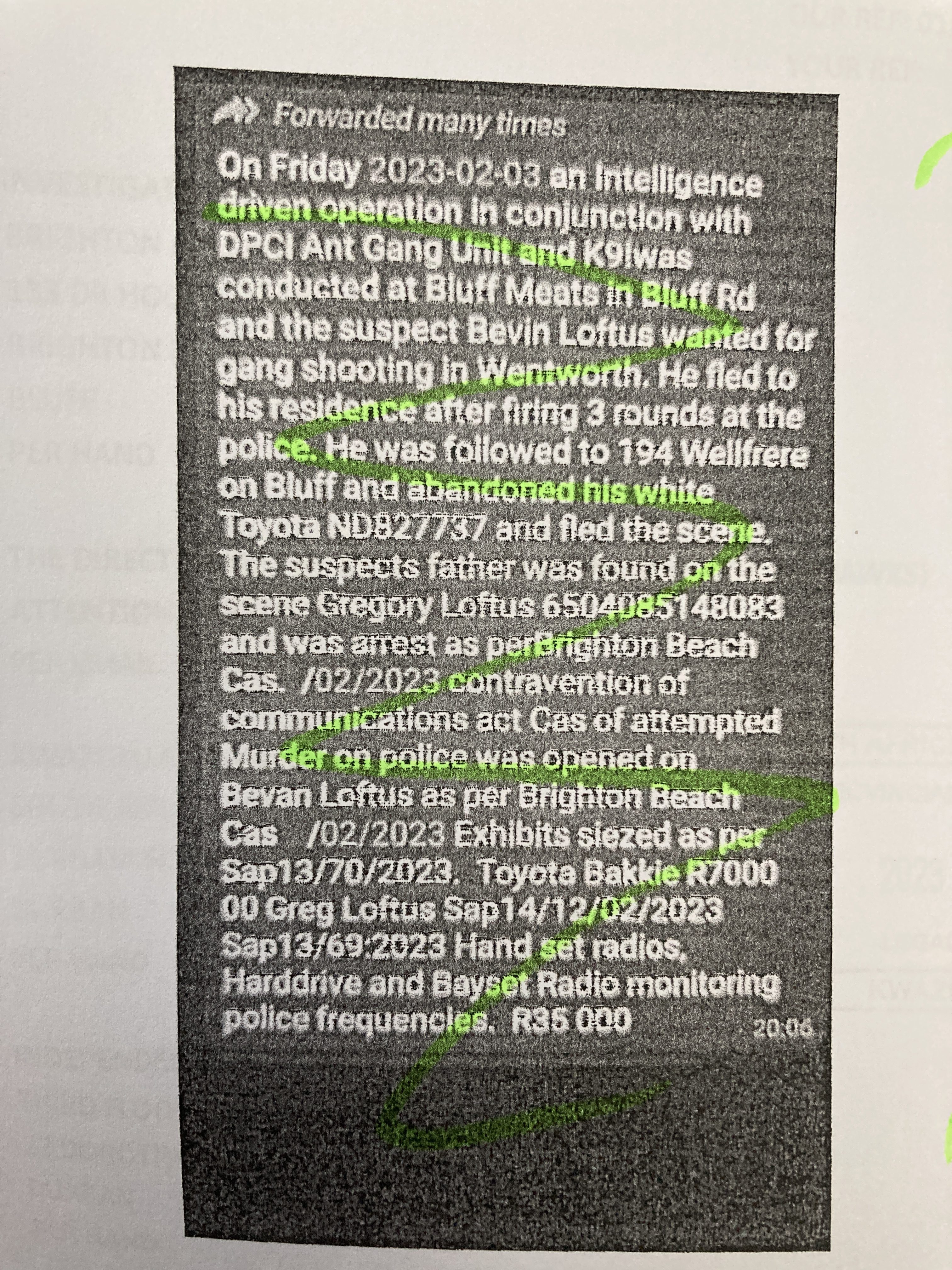
A screenshot of a WhatsApp message in the affidavit.
The R2.5-million bounty
If Gregory Loftus is to be believed, why was his son targeted?
Attached to his affidavit is the transcript of a conversation Bevan allegedly had with Clive Naicker, the owner of Roadstar, a tow truck and panel beating business in Durban.
Gregory says in January his son called Naicker when he heard there was a R2.5-million bounty on his head – he believed Naicker was behind it. Gregory says that given the shootings involving tow truck operators in Durban, his son’s fears were “real and not imagined”.
“I have never met Clive Naicker,” Gregory said, “Bevan didn’t know him, but he knew of him … On 25 January, Bevan called Clive Naicker to establish why he had put a hit on him. Clive Naicker is recorded as saying that Bevan killed his uncle, as per recorded telephonic conversation … When Bevan made mention of the R2.5-million bounty, Clive asks if it was Bevan on the phone.”
In the conversation, the men argue.
Bevan says he never had a problem with Naicker, but that Naicker was after him, paying Deena Govender and “all the kerels [police] to do all these things to me … you want to kill me”.
Naicker says: “Are you making allegations against me or telling me facts?”
Then he accuses Bevan of telling people he killed “Reagan”.
Loftus ends the call by saying: “The fastest lives the longest.”
Clive Naicker speaks
Daily Maverick approached businessman Clive Naicker, who described Bevan Loftus as an “evil young man”.
“I have only had two or three conversations with this evil young man. I don’t know him. I have been in the towing industry for 14 years and I am chairman of our towing industry association. I have never had a confrontation with Bevan. Earlier this year, Bevan called me saying I wanted to kill him.
“I said I heard he killed my uncle [tow trucker Elvis Rajoo in Asherville earlier this year]. I heard on the street that it was a case of mistaken identity … that I was meant to be the target of that shooting. Bevan ended the conversation with, ‘Let’s see who dies first’.
“I have never met Bevan. I am the biggest player in the tow trucking industry in KZN. I own 40 vehicles. My drivers are not violent. I am trying to make the industry peaceful. This young man, Loftus, was a thug – an evil young man.
“Word on the street is that he killed 40 people in Wentworth, Newlands and Sydenham. It is unbelievable. He accused me of lots of things but I never had a confrontation with him. Allegations about me and the cops … the cops dealing with these matters are seasoned, they are Hawks and they do their job well. People can’t bribe them with a few hundred rand. They will arrest you,” said Naicker.
“I don’t know why people are trying to defend Bevan Loftus. He was ruthless – a gangster and a thug. He was the leader of the Hollywood gang and Ryan Santos was a monster. In the news, it says they were found with high-calibre weapons. Those are not decent people. I run a proper business involving a paint and panel shop, tow trucks and taxis.”
Background to the shooting
The shooting of Bevan Loftus and his friends takes place against the backdrop of extraordinary violence in the tow truck industry and in the drug trade, where the assassination of key players has shaken both markets dramatically.
At the scene of the Loftus shooting, KZN police commissioner Lieutenant General Nhlanhla Mkhwanazi bemoaned the use of ride-hailing drivers (like Uber and Bolt) to transport drugs. Police and security experts frequently link drug trafficking to transport-related companies, including tow trucks, taxis and logistics.
A private security operator in Durban told Daily Maverick that, in some instances, drugs are moved around in ambulances.
In March 2021, the Global Initiative Against Transnational Organized Crime (GI-TOC) released a report on the booming heroin market in Durban.
GI-TOC said fieldwork in the city indicated that the “mechanisation” of heroin seems to have boosted the market. Police said there was more violence since capsules entered the market because there was more volume and consequently greater competition.
In 2020 police seized a machine used for filling and processing pharmaceutical-style heroin-filled capsules.
The machine was capable of processing up to 25,000 capsules per hour.
“This step forward in the sophistication of the heroin market has had knock-on effects in terms of profitability, local demand for heroin and on violence.”
Capsulised heroin made for more time-efficient packaging, precise dose allocation and easy distribution. It also allowed for capsule marking or branding that often denoted a drug lord’s turf.
The report said heroin sales were on the rise. It quoted a Durban Metro policeman saying one relatively low-level dealer in Wentworth was arrested in March 2021 and reported selling 2,000 capsules a day, seven days a week.
More volume, a policeman told GI-TOC, meant “more violence”.
Read here: Why heroin capsules have transformed Durban’s drug market. | Risk Bulletin #17 – March–April 2021
Bevan Loftus: monster or lionheart?
While Clive Naicker described Bevan Loftus as evil, and Santos as a monster, Gregory Loftus says his son stood his ground in the tow trucking and taxi business that were frequently characterised by extreme violence.
He said Bevan owned two taxis, six tow trucks and a security company.
“Bevan wasn’t a walkover, but he wasn’t a gangster. He stood up for the underdog. He was a lionheart.”
He was pitched as such by crooked cops, Gregory said, and the legend grew.
“It has been said for years that he was a gangster. It was water off a duck’s back for us.”
Gregory said he himself was being portrayed in the media as a crooked ex-cop and was linked to the allegations against his son – a means, he added, of justifying further action against him.
Why were the cops after Bevan Loftus?
So, why were the police after Bevan Loftus and how did they find him?
There are various theories, but for now, let’s focus on the most public explanation from Police Minister Bheki Cele.
Cele arrived on the scene after the shooting and addressed the media. According to clips from eNCA and the SABC, Cele says: “These guys have been profiled … they have been causing havoc.”
He continued: “The syndicate seems to be much bigger than what we see. It’s a group of guys who looked like the nucleus of this nonsense [of] drug turf wars.”
Cele said they went around eliminating their opposition.
The “stark thing”, Cele said, was that Loftus had a “very long list” of cases against him that were withdrawn.
It would be good to find out how this happened, Cele added.
In a 2 April story on News24, police are quoted saying the shooting followed the arrest of a suspected drug dealer and the murder of three people, including a child, in Springfield Park in Durban on Human Rights Day, 21 March.
The story quotes Cele saying: “We have been having a challenge of shootings and drug-related crimes in KZN, and these suspects are believed to be part of the syndicate who have been operating in Durban and surrounding areas…
“Good work by the team, but there is more that still needs to be done, so we are definitely coming for more of them.”
The tactical operation
According to a message circulated by police and forwarded to Daily Maverick, the following events led to the shooting of Bevan and his friends:
On 1 April, police stopped a white Isuzu double cab bakkie in Pietermaritzburg and established it was stolen.
Inside the vehicle, police found a rifle, ammunition and Mandrax tablets.
A suspect was arrested and taken to his flat in Hillcrest, about 40km from Durban, where another rifle and more ammunition were found.
The suspect led police to the Morningside hideout.
Police from the anti-gang unit, the K9 unit, the national intervention unit, crime intelligence and the provincial special investigation team “tactically penetrated” the flat.
Policemen said the suspects opened fire and a policeman was shot. He escaped injury because of his bulletproof vest.
Five rifles, four pistols and several rounds of ammunition were recovered, along with an undisclosed amount of cash.
The message circulated by police described Bevan Loftus as a “notorious gang boss” sought by the police in several cases. The message says the seized Isuzu bakkie was linked to the triple murder in Springfield Park.
‘Puff’ Kalicharan and other druglords
The Springfield Park murder is a reference to the triple murder on 21 March about 5km from where Chatsworth druglord Brandon “Puff” Kalicharan, his wife Jeconiah and their nine-year-old daughter, Jecaida, were shot dead.
Kalicharan had links to the Cartel gang and was a known rival of druglord Teddy Mafia, who was murdered in January 2021.
Since 2016, there have been several drug-related and tow truck “drive-by” shootings in Durban. Police say most of the killings are linked to turf wars reflecting increased competition in Durban’s drug market.
Killings often indicate a consolidation of the drug trade. Two senior beat cops in Durban have questioned who stood to benefit from the murder of Kalicharan and others. A feature of the drug trade in Durban is repeated allegations of police corruption.
Narrative
Gregory Loftus is out on bail and faces criminal charges, which he denies. He has accused Cele and the police of discrediting him and preparing the ground for yet another arrest.
“The narrative set by the minister and in media reports is that they are coming after me next.”
Loftus questioned why his past as a policeman was mentioned by Cele. “Why? It is as though it is meant to cast aspersions on me. I was a good cop with an unblemished record. I left the police to pursue other opportunities.”
Loftus said an independent investigation would reconstruct the scene where Bevan was shot, and ballistics and statements from neighbours would disprove police claims that there was a gunfight.
“It doesn’t matter who was in that flat. The job of the police is to arrest suspects, not execute them.”
Gregory said he was concerned a hard drive police seized from the family would be destroyed. He said the device would exonerate Bevan. In terms of the interdict, police have until 30 May to respond and return the hard drive or provide reasons they don’t have to do so.
Police response
Captain Deena Govender declined to comment and referred enquiries to the Hawks, whose spokesperson Colonel Robert Netshiunda said: “We are not at liberty to be making pronouncements or comment on matters that are before the courts. We would rather let the wheels of justice roll and create space for the law to take its course.”
Netshiunda said drug dealing and related violence in the province was “a cause for concern” and various police units had success in dealing with this.
“Many suspects have been arrested with large quantities of illegal drugs and huge amounts of money, illegal firearms and ammunition.”
Robbie Raburabu, a spokesperson for the Independent Police Investigative Directorate (Ipid) confirmed that Ipid was “investigating the circumstances surrounding the shooting”.
Daily Maverick visited the scene of the killings.
The walls, pockmarked with scores of bullet holes, will be the subject of close scrutiny to get to the bottom of the shooting and the swirl of contesting claims around it.
A senior policeman with broad knowledge of the drug trade in KZN told Daily Maverick: “This shooting was definitely not an execution. The Ipid investigation will show that. These were bad guys with firepower who were wanted and hiding from the police. Obviously, there will be claims that this was an execution. And it won’t be the first time either.”
Expert input
Monique Marks is a criminologist and research professor at the Durban University of Technology with knowledge of the local drug trade. She said there were constant claims of police collusion with druglords in Durban.
“There have been cases over the years where police involvement in drug businesses has been exposed. There will always be claims of police corruption where there is prohibition, which by its nature drives markets underground. In these situations, users and dealers are at the behest of crooked cops.
“In Durban, talk of police collusion in drugs is rife, especially in areas associated with heroin production, like Chatsworth and Phoenix.”
Marks said it was easy to demonise the police, who had to operate in a “complex world that relies on informers and double agents”.
“Informers are often unwitting participants in the world they are trying to get information on.”
Marks added: “This really raises the importance of the decriminalisation of drugs, which brings drug use, drug markets and the policing of drugs into the open. That’s the only way to really get away from police being involved in criminal networks around drug use and drug markets.
“There is a huge pull towards the decriminalisation of the use and possession of small amounts of drugs in Australia, Portugal and one or two countries in eastern Europe. It is a debate we need to have in South Africa. It is important for public health and public safety.”
source:Gunfight, or police ‘hit’? Interdict against top cops e… (dailymaverick.co.za)
-
AuthorPosts
Viewing 1 post (of 1 total)
- You must be logged in to reply to this topic.

